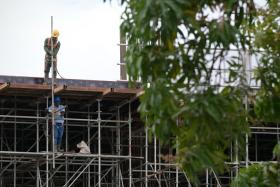Those who breach casino visit limit can now be jailed, fined
Anyone visiting the casino more times than allowed by his family can be jailed for up to a year, or fined up to $10,000 under a proposed new offence.
Family visit limits are made by family members to limit the number of visits to a casino a person makes.
It is currently not illegal for someone to breach these limits, but this could change with the proposed amended law.
It was one of the new offences proposed in the Casino Control (Amendment) Bill, introduced by the Ministry of Home Affairs (MHA) in Parliament on Aug 6.
Casino-related crime remains low in Singapore, with a total of 137 cases reported at both casinos in 2023 and making up only 0.2 per cent of all crimes reported in the Republic that year.
The changes to the law are part of a regular review to ensure it keeps up with changes in the gambling industry, said MHA.
In response to media queries, a Ministry of Social and Family Development (MSF) spokesperson said there have been three to 14 applications a year for family visit limits over the last decade.
These limits can be applied for as long as the family is affected by the gambler’s habits, such as if the gambler neglects his family responsibilities, said the MSF spokesperson.
MHA said that from 2010 to 2023, about five people each year breached their family visit limits.
Those under exclusion orders from casinos will also be subject to tighter laws.
These are people automatically excluded by law as they are undischarged bankrupts or on social assistance programmes, or banned by their families or the National Council on Problem Gambling (NCPG).
As at the end of December 2023, more than 300,000 people are barred from entering the casinos, including those who set the ban themselves, according to data from NCPG.
To prosecute excluded individuals who breach the order, the authorities have to prove that the individuals were aware of their exclusion status. This can be hard to prove.
The new law proposes that it will be a crime as long as the excluded person knows, or ought reasonably to know, about his exclusion status – for example, if he was informed via courier delivery.
It will also be an offence to withdraw bets after the result of a game is known.
Currently, it is an offence only to place a bet after the result is known, but not to withdraw it.
There were 10 people investigated for this act between 2010 and 2023.
But the police had to use other laws such as theft in dwelling to deal with them.
Recording non-card games will also be made illegal. Existing laws state only that recording card games is illegal.
A foreign syndicate that unlawfully recorded the cards during baccarat games at the Marina Bay Sands (MBS) casino won $433,730 at the tables over a week in December 2022.
Three men were jailed.
MHA said patrons have tried to cheat casinos by recording the play patterns of non-card games such as gaming machines.
Minors who refuse to give their particulars, or use false evidence of their age to enter the casinos, will face higher maximum fines of $10,000, up from the current $1,000.
Only those aged 21 and above can enter Singapore’s casinos.
MHA said that in the past five years, two to four minors each year tried to enter a casino using false evidence of age.
The two casinos here, MBS and Resorts World Sentosa (RWS), are not allowed to directly share with each other the personal data of patrons without the patrons’ consent.
But this information sharing might be necessary for the casinos to assess if a patron is linked to money laundering and terrorism financing activities.
The Gambling Regulatory Authority facilitates the information exchange instead, but this is operationally inefficient and impedes casino operators from taking timely action, said MHA.
With the new Bill, the two casinos will be allowed to share patrons’ information with each other to tackle such crimes.
In response to media queries about high-risk patrons, MHA said they include politically exposed individuals.
These are people who have been entrusted with a prominent public function and whose positions could potentially be abused for illegal activities, such as corruption and bribery.
Other high-risk patrons include those from a jurisdiction identified to have inadequate measures to prevent money laundering and terrorism financing, and those engaged in unexpectedly large transactions.
When contacted by The Straits Times, RWS declined comment.
A spokesperson for MBS said it continually assesses and adheres to the regulations governing its business.
Said the spokesperson: “We remain as committed as ever to comply with the upcoming changes to the regulatory requirements outlined in the Casino Control Act.”
Get The New Paper on your phone with the free TNP app. Download from the Apple App Store or Google Play Store now


